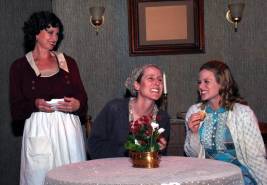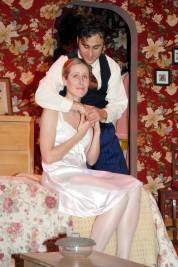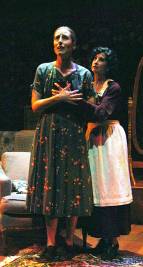
On the surface, Rose White would appear to be the quintessential All American New Yorker circa 1946. She has her own West Side apartment, a good job, a fashionable wardrobe, and an independent lifestyle. Scratch a little deeper, however, and you’ll discover that Rose White is European-born Rayzel Weiss, the daughter of Polish Jews born just a decade before Hitler’s rise to power. Papa Mordechai and four-year-old Rose emigrated to America in the mid-1920s, but older sister Lusia came down with scarlet fever shortly before the family’s planned departure, so Mama and Lusia stayed behind. Then came the Nazis, and mother and daughter were shipped off to Auschwitz along with everyone else in their extended family. Only Lusia survived. Now, a year after the declaration of peace in Europe, older sister has come to America at last.
Thus begins Barbara Lebow’s powerful family drama, A Shayna Maidel, now playing at Long Beach’s International City Theatre in a Shashin Desai-directed production that could not be better.
This is the kind of play that sneaks up you, and before you know it, you find that it has attached itself to your heart.
When Rose (Laura Howard) learns of Lusia’s impending arrival from her very old-school father (Larry Eisenberg), she’s not all that keen about sharing her apartment with a sister she can scarcely remember, especially when Papa informs her that Lusia (Liza de Weerd) will get Rose’s bedroom and Rose will get … the living room couch. Younger sister puts up a good front, however, once older sis has arrived, insisting that she always sleeps on the sofa in order to leave the bedroom available for guests. Lusia’s drab, haggard appearance and earnest but not always effectual efforts to express herself in English have had an effect on Rose, and not surprisingly, these two very different sisters begin to bond.
Lusia’s memories are never far from the surface, however, and she frequently flashes back to her life before the camps, to conversations with her mother (Julia Silverman), best friend Hanna (Erin Anne Williams), and husband Duvid (Charles Pasternak). At other times, Lusia fantasizes that Duvid is with her in Rose’s apartment, and shares with him her feelings about being reunited with her sister, and her hopes that somehow, miraculously, he has survived the Holocaust and will soon be once again with his beloved.
Not much “happens” in A Shayna Maidel, but that doesn’t stop Lebow’s play from engrossing its audience in Rose and Lusia’s story, and investing us in the hope that Duvid is indeed alive.
One reason that A Shayna Maidel succeeds so well in its storytelling is that playwright Lebow lets us see Lusia both from the outside and from the inside. We observe her as the foreigner her sister sees, one whose stumbling efforts to speak English are impeded by a Eastern European accent and limited vocabulary. We also see and hear Lusia as she sees and hears herself. Conversations with Duvid, Mama, or Hanna that begin in Yiddish quickly transition into colloquial, unaccented English, allowing us to know the real Lusia, free from the filter of foreignness that we feel when she is struggling with a second language.
There are many powerful moments in A Shaina Maidel, none more devastating than a scene in which father and daughter compare lists of family members each has compiled, and for every name Mordechai reads off, Lusia responds either “dead” or “murdered.” The Holocaust in a nutshell, and made personal as rarely before.
Under Desai’s sensitive, nuanced direction, the entire cast do superb work, particularly de Weerd, whose performance as Lusia shows us the cheery façade the new immigrant presents to the world, the wounded soul tormented with nightmares, and the loving wife unable to give up hope of her husband’s survival, a hope she keeps alive by talking to him as if he were already back by her side.
Because Howard’s Rose is so perky and charming, the scene where younger sister finally breaks down from the realization of all she and her family have lost is all the more powerful. As Mordechai, Eisenberg gives us a man whose efforts to harden his heart as a result of almost unbearable suffering have not destroyed his power to love. Pasternak (an absolutely brilliant Hamlet earlier this year) gives a rich, multi-layered performance as Duvid, both the romantic, caring husband and the physically and emotionally scarred Holocaust victim. In smaller roles, Silverman is a warm and winning Mama and Williams a delightfully buoyant Hanna.
A Shayna Maidel gives Stephen Gifford yet another opportunity to show off his scenic designing gifts, creating a finely detailed, mid-20th Century New York apartment with arched passageways and lots of wallpaper and chintz. Kudos go too to property designers Patty and Gordon Briles for their set decoration. Chris Kittrell once again does double duty as lighting and sound designer (a rarity in L.A. theater). His gorgeous lighting enhances the play’s moods, and for the most part tells us whether we are in the present reality, or in a fantasy or flashback sequence, though these distinctions were not quite as well delineated as they could have been. His sound design, on the other hand, is perfection, layering klezmer tunes (including some Eastern European-tinged Gershwin), ghostly echoes, and the clatter of freight cars transporting Jews to the camps. Kim DeShazo’s costumes reflect both the play’s post-WWII setting and the characters who are wearing these clothes. Hair and wig design by Tony Gagliardi are also period-appropriate. Melissa Giattino and Richard Schwartz have choreographed a joyous dance number. Maya Rodgers is production stage manager and casting is by Michael Donovan Casting.
Geffen/Taper/Pasadena Playhouse aficionados would do well to pay heed to the fine work being done at International City Theatre. A Shayna Maidel is ICT at its best, and deserves to be seen by as wide an audience as attend its better known counterparts.
International City Theatre, Long Beach Performing Arts Center, 300 E. Ocean Blvd., Long Beach.
www.InternationalCityTheatre.org
–Steven Stanley
June 17, 2010
Photos: Shashin Desai





 Since 2007, Steven Stanley's StageSceneLA.com has spotlighted the best in Southern California theater via reviews, interviews, and its annual StageSceneLA Scenies.
Since 2007, Steven Stanley's StageSceneLA.com has spotlighted the best in Southern California theater via reviews, interviews, and its annual StageSceneLA Scenies.







 COPYRIGHT 2024 STEVEN STANLEY :: DESIGN BY
COPYRIGHT 2024 STEVEN STANLEY :: DESIGN BY